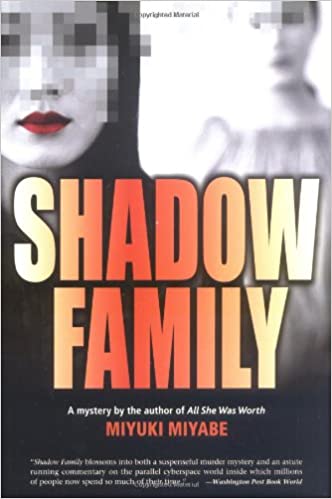One of the most acclaimed writers of genre fiction in Japan, Miyuki Miyabe has been the recipient of numerous literary awards, while her works have been translated into over a dozen languages and found their way to the big screen numerous times. “Shadow Family” (original Japanese title is “RPG”) is another testament to her prowess.
The police are investigating the double murder of Ryosuke Tokoroda, a middle aged employee and his college-age mistress, Naoko Imai. Soon, the police discover email correspondence among the latter and members of an online group that play at being a family, with him being the Dad alongside Mother, a daughter who has the same name with his actual one, Kazumi, and a boy who “plays” the younger brother, Minoru. The suspicions soon fall on the rest of the members, and Miss A, another woman in Tokoroda's life.
Veteran Desk Sergeant Takegami finds himself handling the investigation and the subsequent interrogation of both family members, after his colleague, Nakamoto, another “pencil pusher” is off due to health issues. In his effort, he is partnered with his old friend Detective Chicako Ishizu, who has been recently demoted after botching up a high profile case. The two, working on their own and Nakamoto's hunch, try to unravel the mystery behind the murders.
Probably the most intriguing element of Miyuki Miyabe's writing here is the build up to the final revelation, with the book starting with a single email, moving on to the murders, then to police force politics and particularly the place of women, before settling on the interrogation, in a way that is as smooth as it is surprising. It is easy to say the Miyabe actually makes her readers forget what this is about, as the secondary arcs, which mostly focus on the personas of the police officers, are quite intriguing. At the same time, with this tactic, she succeeds in making the reader forget the “trick”, which is actually mentioned early on while making the whole novel about a number of things apart from the central whodunit element. It is also easy to say that the revelation of the murderer takes a back seat here, with the method, and the social and psychological comments taking the front, in a trait that is actually one of Japanese mystery literature as a whole.

However, it is somewhere here that the book's most significant issue also lies, since this “diversion” goes a bit too far, particularly in the beginning, where the introduction of a plethora of characters that end up playing little to no role in the story makes the narrative difficult to follow.
On the other hand, and apart from the rather smart case, Miyabe's comments are quite interesting. The concept of family, what constitutes one, the dysfunctionality frequently appearing inside them and the fact that kids cannot understand their parents and vice versa, but still can end up just like each other, is the most central one in the novel, with the author “exploiting” it in the best way possible. The concept of identity, and particularly why people occasionally like to role-play and the secrets everyone hides even from their own families also plays a crucial role in the book. Lastly, the concept of the Internet, and how easily one can mask their identity on the web as much as how easily they can find ways to satisfy even their most basic psychological needs, concludes the rather rich context in the novel.
That Miyabe manages to include all the aforementioned in just 190 pages (Kodansha edition) is a testament to her economical approach, in another trait of Japanese literature as a whole. Furthermore, the language is simple for the most part, made up of short sentences, while the variations in the type of narration (emails, first person, third person) works excellently, finding their apogee in the interrogation part. The various flashbacks/revelations are well placed throughout the story, while Takegami and Kazumi emerge as rather interesting characters. From the secondary ones, the one that stands out is Chicako, with her overall demeanor towards Kazumi being as surprising as it is intriguing.
Despite some unnecessary complexity regarding the number of characters, “Shadow Family” emerges as an excellent novel, one that thrives on characterization, story, and commentary, in another great work by Miyuki Miyabe.















